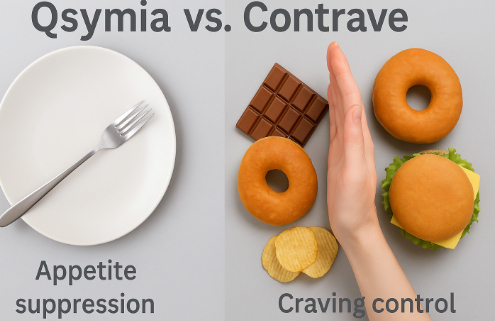Qsymia® for Weight Loss
Qsymia® is a prescription medication used to assist with weight loss in compatible individuals struggling with obesity.
It combines two active ingredients, phentermine and topiramate known together as phentermine-topiramate which work together to help suppress appetite and enhance feelings of fullness. Clinical studies have shown that a 92 mg dosage of Qsymia is effective in weight loss and BMI reduction among patients with obesity and obesity-related comorbidities.
Read this weight loss drug resources page to learn more about how Qsymia® may fit into your weight loss journey with SANEMD.
Qsymia Takeaways
- Combination of phentermine and topiramate: Qsymia® utilizes a dual-action formula in the form of extended-release capsules designed to curb hunger and boost satiety, making it a promising option for long-term weight management.
- FDA-approved: Qsymia® is one of the few prescription weight loss medications approved by the FDA for chronic weight management.
- Potential side effects: Like many medications, Qsymia® has side effects ranging from mild to severe, which should be considered before starting the treatment.
- Dosage adjustments for moderate hepatic impairment: Patients with moderate hepatic impairment should not exceed a maximum dosage of 7.5mg/46mg once daily.
- Dosage recommendations for renal impairment: For patients with renal impairment, the maximum dosage should be limited to 7.5mg/46mg once daily for those with a creatinine clearance (CrCl) of less than 30 mL/min or between 30 to less than 50 mL/min.
What is Qsymia® (Phentermine/Topiramate), and how does it work?
Qsymia® is a combination medication designed to aid weight loss by targeting two key areas of appetite control.
Phentermine, a stimulant similar to an amphetamine, suppresses hunger, while topiramate, an anticonvulsant, helps with feelings of fullness and reduced cravings.
Together, these ingredients create a promising tool for those of a specific Weight Loss Drug Type who have been unable to lose weight through diet and exercise alone. However, Qsymia should be avoided in patients with severe hepatic impairment due to heightened risks.
Who is Qsymia® for?
Qsymia® is typically prescribed for a certain subset of adults who have a Body Mass Index (BMI) of 30 or higher, which is categorized as obese.
It may also be prescribed for individuals with a BMI of 27 or higher who have weight-related health issues like type 2 diabetes, high blood pressure, or hypertension.
It is not intended for casual weight loss and should only be used under the guidance of a healthcare provider.
Potential Health Benefits of Qsymia® for Weight Management
The potential benefits of Qsymia® go beyond weight loss. Clinical trials have demonstrated that it can also lead to improvements in other health markers, including:
- Improved blood sugar control: This is especially helpful for individuals with type 2 diabetes.
- Lowered blood pressure: Reducing weight helps lower hypertension, decreasing the risk of heart disease.
- Better cholesterol levels: Weight loss contributes to a healthier lipid profile, improving overall heart health.
These potential benefits make Qsymia® a promising option for tackling obesity and its associated health risks.
Dosage and How to Use Qsymia®
Qsymia® is typically started at a low dose and gradually increases over time, depending on how the patient responds to the medication.
The most common starting dose is 3.75 mg of phentermine and 23 mg of topiramate, taken once daily. If weight loss is insufficient after 12 weeks, the doctor may increase the dose to 7.5 mg/46 mg.
It’s important to follow the prescribed dosing schedule closely.
Taking Qsymia® in the morning is recommended to avoid the risk of insomnia due to its stimulant effects.
Additionally, a negative pregnancy test is required before starting Qsymia®, and this test must be repeated monthly during treatment to ensure safety and prevent potential harm to an unborn baby.
Effectiveness of Qsymia® for Weight Loss: Insights from Clinical Trials
Qsymia® has been shown to be a promising option in clinical studies, with patients losing an average of 10-12% of their initial body weight over a one-year period.
This makes it one of the more successful prescription weight-loss medications available today.
However, its potential effectiveness is closely linked to the combination of medication, a healthy diet, and regular physical activity.
Potential Side Effects of Qsymia®
Like all medications, Qsymia® comes with a range of potential side effects. Common side effects include:
- Dry mouth
- Tingling in hands and feet
- Dizziness
- Constipation
- Insomnia
More serious side effects, although rare, may include:
- Mood changes or symptoms of depression
- Increased heart rate
- Eye problems such as sudden vision changes
- Serious skin reactions, such as Stevens-Johnson syndrome and toxic epidermal necrolysis. Monitor for symptoms like blistering or peeling skin, and contact your doctor immediately if these occur.
- Severe mood changes, which can affect overall performance and quality of life. Consult your healthcare provider if you experience significant mood or mental changes.
- Metabolic acidosis, a condition where acids accumulate in the body. It is important to monitor for metabolic acidosis as a potential risk when using Qsymia®.
- Kidney stones: Qsymia® can increase the risk of kidney stones. Staying well hydrated can help prevent their formation. Seek medical attention if you experience severe pain in your lower back, sides, or lower abdomen/groin or blood in your urine, which could indicate kidney stones.
- Secondary angle closure glaucoma: This serious eye condition can manifest as acute myopia and visual symptoms. Discontinue Qsymia® and contact your doctor immediately if you experience these symptoms, as they could indicate the onset of secondary angle closure glaucoma.
There is also an increased risk of hypoglycemia for diabetic patients and cleft formation related to pregnancy use.
Make sure to take the Weight Loss Drug Type Quiz here, and talk to your doctor about any worries or potential side effects to see if Qsymia® is still the right choice for you.
Common Side Effects of Qsymia®
While Qsymia® can be an effective tool for weight loss, it’s important to be aware of its potential side effects. Common side effects include:
- Dry mouth: This is one of the most frequently reported side effects. Staying hydrated can help alleviate this symptom.
- Tingling in hands and feet: Known as paresthesia, this sensation is usually mild and temporary.
- Dizziness: Some users may experience lightheadedness, especially when standing up quickly.
- Constipation: Increasing fiber intake and staying hydrated can help manage this side effect.
- Insomnia: Taking Qsymia® in the morning can help reduce the risk of sleep disturbances.
More serious side effects, although rare, may include:
- Mood changes or symptoms of depression: It’s crucial to monitor your mental health and seek medical advice if you notice significant changes.
- Increased heart rate: Regular monitoring of your heart rate is recommended.
- Eye problems: Sudden vision changes should be reported to a healthcare provider immediately.
- Serious skin reactions: Conditions like Stevens-Johnson syndrome and toxic epidermal necrolysis require immediate medical attention.
- Metabolic acidosis: This condition involves an accumulation of acids in the body and requires monitoring.
- Kidney stones: Staying well-hydrated can help prevent their formation.
If you experience any of these side effects, consult your healthcare provider to determine the best course of action.
Interactions with Medicines and Foods
When taking Qsymia®, it’s crucial to be aware of potential interactions with other medications and certain foods.
The combination of phentermine and topiramate can interact with a variety of substances, which may either diminish its effectiveness or heighten the risk of potential side effects.
For instance, Qsymia® can interact with prescription pain medicines, birth control pills, sleep medicines, and other medications, potentially leading to adverse reactions or reduced efficacy. The interaction with sleep medicines, in particular, can increase drowsiness or reduce alertness, so it is important to consult your doctor about any concurrent use.
Before starting Qsymia®, make sure to inform your healthcare provider about all the medications, vitamins, and supplements you are currently taking.
This includes over-the-counter drugs and herbal supplements.
By keeping your healthcare provider informed, you can help ensure that Qsymia® is both safe and useful for part of your weight loss regimen.
Alternatives to Qsymia®
If Qsymia® isn’t the right fit for you, or if you experience side effects, there are several alternative weight loss medications and treatments that your healthcare provider might recommend. Here are some options:
- Orlistat (Alli, Xenical): This medication works by inhibiting lipase, an enzyme that breaks down fats in your diet, thereby reducing fat absorption and helping you lose weight.
- Lorcaserin (Belviq): A serotonin receptor agonist that helps reduce hunger by affecting brain signals that control appetite.
- Bupropion/Naltrexone (Contrave): This combination of medications targets the brain’s hunger and reward pathways, helping to reduce hunger and increase feelings of fullness.
- Liraglutide (Saxenda): A glucagon-like peptide-1 (GLP-1) receptor agonist that helps control appetite and increase feelings of fullness, making it easier to stick to a reduced-calorie diet.
- Behavioral Therapy: A non-pharmacological approach focusing on changing eating habits and increasing physical activity through counseling and support.
Each of these alternatives has its own set of benefits and potential side effects.
It’s essential to discover your Weight Loss Drug Type (quiz here) and discuss these options with your healthcare provider to determine the best course of treatment for your weight management needs.
Whether you choose medication or behavioral therapy, the goal is to find a sustainable and effective way to lose weight and improve your overall health.
Who Should Avoid Qsymia®?
Qsymia® is not suitable for everyone. It should be avoided by:
- Pregnant women, as it can cause birth defects.
- Individuals with glaucoma or hyperthyroidism.
- People taking MAO inhibitors or other medications that could interact with Qsymia®.
- Individuals with potential drug interactions, as certain substances can affect the effectiveness or safety of Qsymia®. Notify your healthcare provider about any other medications or supplements you are taking.
Always consult your healthcare provider before starting Qsymia® to ensure it’s safe based on your medical history and current medications.
Storage and Disposal of Qsymia®
Proper storage and disposal of Qsymia® are essential to ensure the medication’s effectiveness and safety. Here are some guidelines:
- Storage: Keep Qsymia® in its original container, tightly closed, and out of reach of children. Store it at room temperature, away from excess heat and moisture (not in the bathroom). Avoid exposing the medication to direct sunlight.
- Disposal: Do not flush Qsymia® down the toilet or pour it into a drain unless instructed to do so. The best way to dispose of your medication is through a drug take-back program. If one is not available, mix the medication with an unpalatable substance (like dirt, cat litter, or used coffee grounds), place it in a sealed plastic bag, and throw it in the household trash.
By following these guidelines, you can help ensure that Qsymia® remains effective and reduce the risk of accidental ingestion or environmental harm.
Getting Started with Qsymia®
Initiating Qsymia® treatment involves several important steps to ensure its effectiveness and safety:
- Medical Evaluation: Before starting Qsymia®, a thorough medical evaluation is necessary. This includes a review of your medical history, current medications, and a negative pregnancy test for women of childbearing age. Regular pregnancy tests are required throughout the treatment.
- Lifestyle Adjustments: Qsymia® works best when combined with a reduced-calorie diet and regular physical activity. Your healthcare provider can help you develop a personalized plan that includes healthy eating and exercise routines.
- Support Programs: Take advantage of free support programs offered by healthcare providers or the Qsymia® manufacturer. These programs can provide additional resources, such as meal plans, exercise tips, and motivational support to help you stay on track.
- Monitoring and Follow-Up: Regular follow-up appointments with your healthcare provider are crucial to monitor your progress, adjust dosages if necessary, and manage any side effects. This ongoing support can help you achieve the best possible outcomes with Qsymia®.
By following these steps, you can set a strong foundation for successful weight management with Qsymia®. Always consult your healthcare provider to tailor the treatment to your specific needs and circumstances.
Frequently Asked Questions about Qsymia®
When considering a prescription medication like Qsymia® for weight loss, it’s natural to have questions about how it works, who it’s for, and what to expect.
Below, we’ve compiled answers to some of the most frequently asked questions about Qsymia® to help you better understand the medication, its effects, and how to use it safely.
1. How long does it take for Qsymia® to start working?
Most patients start experiencing appetite suppression within the first few days of taking Qsymia®, which can lead to early weight loss results.
However, substantial weight loss is typically seen after several weeks of consistent use.
It’s important to remember that Qsymia® works best when combined with a reduced-calorie diet and regular physical activity.
The extent and speed of weight loss can vary depending on individual factors such as Weight Loss Drug Type, lifestyle changes, and initial body weight.
For many users, noticeable weight loss happens within the first 3 to 6 months.
2. Can I take Qsymia® if I have diabetes?
Yes, Qsymia® is often prescribed to compatible individuals with type 2 diabetes who are also struggling with obesity.
One added benefit of weight loss with Qsymia® is improved blood sugar control, which can help lower the need for diabetes medications over time.
However, if you’re diabetic, it’s crucial to monitor your blood sugar levels closely, as rapid weight loss can affect your glucose levels.
Your doctor may need to adjust your diabetes medications, such as insulin or oral hypoglycemics, while you’re taking Qsymia®.
Always discuss your medical history with your healthcare provider to ensure the safest treatment approach.
3. Is it safe to drink alcohol while taking Qsymia®?
Alcohol consumption is generally discouraged while taking Qsymia®.
Both alcohol and Qsymia® can have a sedative effect, and combining the two can increase the risk of side effects such as dizziness, drowsiness, and impaired cognitive function.
Additionally, alcohol may interfere with the weight loss process by adding empty calories to your diet and impacting your motivation for healthy eating and exercise.
If you do choose to drink alcohol, it’s best to do so in moderation and discuss it with your doctor to ensure it won’t affect your treatment.
4. How much weight can I expect to lose on Qsymia®?
The amount of weight loss on Qsymia® can vary from person to person, depending on individual factors such as Weight Loss Drug Type, diet, exercise habits, and metabolism.
In clinical trials, patients taking Qsymia® lost an average of 10-12% of their body weight over the course of one year.
For someone weighing 200 pounds, this could mean a loss of 20 to 24 pounds.
Keep in mind that these results are typically seen in certain individuals who also commit to significant lifestyle changes, such as following a reduced-calorie diet and increasing their physical activity.
Weight loss may be gradual, but steady progress is a positive indicator of long-term success.
5. What happens if I miss a dose of Qsymia®?
If you accidentally miss a dose of Qsymia®, it’s recommended to take the missed dose as soon as you remember, unless it’s almost time for your next dose.
In that case, skip the missed dose and resume your regular dosing schedule.
Never double up on doses to make up for a missed one, as this can increase the risk of adverse effects like insomnia or increased heart rate.
Missing a single dose occasionally won’t significantly affect your progress, but try to take the medication consistently to ensure the best results.
If you’re unsure what to do after missing a dose, consult your healthcare provider for guidance.
Conclusion
Qsymia® offers a promising option for compatible individuals struggling with obesity and related health conditions.
By combining the appetite-suppressing effects of phentermine with the satiety-boosting power of topiramate, it helps people achieve meaningful weight loss.
However, it’s important to approach Qsymia® as part of a comprehensive lifestyle change, including healthy eating and regular exercise.
Always consult a healthcare provider to determine if Qsymia® is right for your weight loss journey.
References
https://qsymia.com/
New Qsymia Drug Resources Below:










